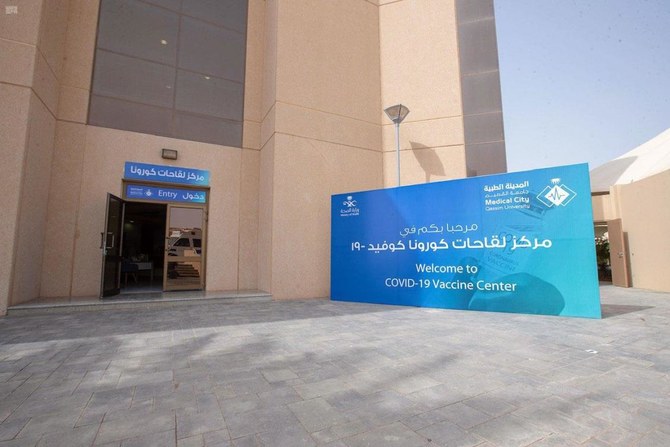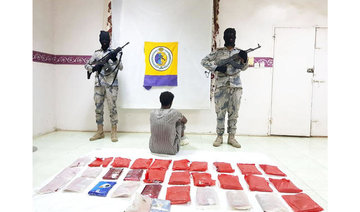MANILA: More than 800,000 Filipino expatriates in Saudi Arabia will receive a free COVID-19 vaccine as part of the Health Ministry’s drive to inoculate all residents in the Kingdom, Saudi Ambassador to the Philippines Dr. Abdullah bin Nasser Al-Bussairy said.
“The Embassy of the Kingdom of Saudi Arabia in Manila confirms that more than 800,000 Filipinos residing in the Kingdom are included in acquiring the coronavirus vaccines for free,” he said in a statement on Thursday.
The campaign, he added, is a continuation of the Kingdom’s “great efforts and proactive steps” since the start of the pandemic and will include foreign residents, “regardless of their nationality and status of their residency without any legal consequences.”
“It is an important step in addressing the pandemic and preserving the health and safety of the citizens and residents on its lands,” he said.
Commending the Kingdom on its move, Philippine Ambassador to Saudi Arabia Adnan Alonto said: “The Filipino labor force is an important component of Saudi Arabia’s economic recovery amid this pandemic.”
“I have no doubt that the Kingdom will vaccinate all residents until herd immunity is reached and realized,” Alonto told Arab News on Saturday.
He added that the Kingdom’s vaccination process involved a “simplified, systematic and impressive set of protocols” designed to inoculate all citizens and expatriates.
“To date, almost 4 million residents have been vaccinated, and the numbers increase by the minute,” Alonto said, adding that as of March 19, the Philippine Embassy in Saudi Arabia had reported 445 active cases of COVID-19 infections among Filipinos, with 549 recoveries and 420 deaths.
“We are still trying to get data on the number of OFWs (overseas Filipino workers) who have been inoculated,” he said.
Al-Bussairy said that the “Human Health and Their Safety First” campaign launched by Saudi King Salman aims to “provide complete health care to all those infected with the coronavirus.”
He said the Kingdom had supported international efforts to combat the pandemic and had contributed to the international COVAX facility to accelerate the availability of vaccines. It has given $150 million to the Global Alliance for Vaccines and Immunization “to make it available to all countries of the world in an equitable manner,” according to Al-Bussairy.
This is in addition to the Saudi government’s support for the UN response plan to combat the pandemic and several projects supported by various UN organizations and agencies.
“The Kingdom desires to be one of the top countries in the world in performing humanitarian actions due to its concern for human rights at the international level, the most significant of which is the aid and donations provided by the Kingdom to many countries, especially those that have been greatly affected by this pandemic,” Al-Bussairy said.
Saudi envoy in Manila highlights Kingdom’s policy of free jabs to all
https://arab.news/gtqj5
Saudi envoy in Manila highlights Kingdom’s policy of free jabs to all

- Focus on Kingdom’s initiative to inoculate all residents against coronavirus, irrespective of nationality or residential status
- Alonto: “The Filipino labor force is an important component of Saudi Arabia’s economic recovery amid this pandemic”
Female tour guides prove key to improving the Makkah pilgrimage experience

- Guides fluent in multiple languages and well-versed in cultural and religious history
- “Through storytelling, we reveal the meaning behind each site, trace the city’s historical evolution, and bring to life the journeys of the Prophet”
MAKKAH: Amid a record-breaking influx of pilgrims this year, female tour guides in Makkah have become an integral part of the experience.
Their fluency in multiple languages and deep knowledge of the Holy City’s history and landmarks have made them invaluable to both pilgrims and visitors.
They share information, help visitors navigate sacred sites and teach people about culture and religion — all of which help make the experience even more memorable.
One of the women, Itimad Ghazzawi, said: “Our mission is to enrich (pilgrims’) journey — not just by guiding them through rituals, but by offering a deeper connection to the Islamic heritage and culture embedded in this sacred city.”
She explained that tour guides speak multiple languages, as Makkah brings together people from all around the world.
“We strive to master these languages to become a bridge between the pilgrim and this sacred city,” she said. “Through storytelling, we reveal the meaning behind each site, trace the city’s historical evolution and bring to life the journeys of the Prophet, his noble companions, and the defining moments that shaped Islamic history.
“We also offer reassurance to pilgrims, many of whom are visiting for the first time and may feel uncertain about where to begin or how to perform the rituals properly. We help them navigate the holy sites, from Makkah’s historic mountains and museums to its valleys, ravines, Jabal al-Nour and the Cave of Hira, making every step smoother and more meaningful.”
She added: “Some arrive feeling anxious about the crowds or overwhelmed by language barriers, and we’re there to ease those worries, instill confidence, and ensure their pilgrimage is both smooth and spiritually fulfilling.”
Fellow guide Rania Chaudhry emphasized that enriching the pilgrim experience required extensive knowledge.
“We go far beyond surface-level facts,” she told Arab News. “We delve into historical texts, study key Islamic events and consult trusted sources, research extensively, and listen to historical narratives to ensure everything we share is both accurate and meaningful.
“At the same time, we embrace modern technology, using apps and interactive platforms to connect with visitors and deliver guidance in ways that are engaging, accessible, and relevant.”
She added being a tour guide was “a mission, one that fills us with pride. It is an opportunity to serve the guests of God and reflect an honorable image of Makkah, as well as of Saudi women, who have become an integral part of this meaningful field.
“There’s a profound sense of fulfillment in a pilgrim’s eyes filled with gratitude, knowing they felt more at ease, more connected and better informed during their visit to this sacred place.”
While at times the guides face challenges — such as navigating heavy traffic or responding to complex and unexpected questions — Chaudry said these only strengthened their commitment.
“Such experiences push us to sharpen our skills,” she said.
“We are honored to be part of each pilgrim’s journey, helping them see Makkah with eyes of understanding and hearts full of reverence. We love what we do, because it allows us to serve the guests of God and enrich their spiritual journey with knowledge, passion and purpose.”
Saudi drug busts lead to multiple arrests

- General Directorate of Narcotics Control arrested three citizens and a Yemeni resident in Najran for selling tablets regulated by medical circulation laws
- Border Guard patrols in Al-Aridah, Jazan, thwarted the smuggling of 31 kg of hashish and arrested six Yemenis for smuggling 83 kg of qat
RIYADH: Saudi authorities carried out multiple drug-related arrests across the Kingdom, the Saudi Press Agency reported on Tuesday.
The General Directorate of Narcotics Control arrested three citizens and a Yemeni resident in Najran for selling tablets regulated by medical circulation laws.
In another operation, a Yemeni and a citizen were arrested with 56,119 tablets.
Authorities in Al-Dayer, Jazan, foiled an attempt to smuggle 33,450 tablets.
Border Guard patrols in Al-Aridah, Jazan, thwarted the smuggling of 31 kg of hashish and arrested six Yemenis for smuggling 83 kg of qat.
Two Pakistanis were arrested in Jeddah with 4 kg of methamphetamine, also known as shabu.
Border Guard patrols in Al-Raboah, Asir, arrested eight Yemenis and Ethiopians for smuggling 144 kg of qat.
Authorities also arrested four citizens in the Eastern Province for selling hashish and amphetamines.
Preliminary legal procedures were completed, and all seized items were transferred to the relevant bodies.
Authorities have urged the public to report drug smuggling or selling by calling 911 in Makkah, Riyadh and the Eastern Province, or 999 in other regions.
Reports can also be submitted, in strict confidence, to the General Directorate of Narcotics Control at 995 or via email at 995@gdnc.gov.sa
Regions celebrate Eid with cultural diversity and community engagement

- Cities and towns across the Kingdom are hosting Eid Al-Fitr events that blend traditional cultural performances with modern entertainment
RIYADH: Municipalities across Saudi Arabia are hosting Eid Al-Fitr events that blend traditional cultural performances with modern entertainment.
In Hail, the celebrations have attracted visitors of all ages with activities including theatrical performances, the Ardah dance — inscribed on UNESCO’s Intangible Cultural Heritage of Humanity in 2015 — and popular folklore shows.
Baha Municipality has distributed 3,000 gifts as part of its celebrations and organized 55 community events, including traditional performances, fireworks, family festivals and children’s theater.
Asir Municipality prepared over 470 parks and squares in preparation for Eid, hosting diverse cultural and recreational events, while in Abha, Eid Al-Basta festivities at the Heritage Village have featured traditional performances, boosting tourism and supporting local businesses.
Qassim’s celebrations have included folk arts, with audiences enjoying traditional chants and performances, and Al-Aan Palace in Najran has attracted visitors with its stunning views and unique architecture, offering insights into the region’s history and culture.
The Royal Commission for Makkah City and the Holy Sites organized programs at locations including the Hira Cultural District and Makkah Mall, drawing thousands of families.
Taif’s parks have also hosted a range of events, attracting over 200,000 attendees with cultural performances and spectacular fireworks.
Meanwhile, the Diriyah Gate Development Authority’s Eid celebrations included children’s games, calligraphy and more, bringing cheer to the historic district of At-Turaif and Bujairi Terrace.
Saudi publishers connect globally at Bologna fair

- CEO of the Literature, Publishing and Translation Commission said that the Kingdom’s involvement aims to showcase a range of programs
RIYADH: Saudi Arabia inaugurated its pavilion at the Bologna Children’s Book Fair, held from March 31 to April 3 at the BolognaFiere Exhibition Center in Bologna, Italy.
Abdullatif Al-Wasel, CEO of the Literature, Publishing and Translation Commission, said that the Kingdom’s involvement aims to showcase a range of programs, the Saudi Press Agency reported.
He added that these efforts focus on developing the publishing industry, fostering cultural engagement, supporting Saudi publishers and literary agents globally, and highlighting the Kingdom’s rich intellectual heritage and literary output.
Al-Wasel added that the fair provides a valuable platform for Saudi publishers to connect and exchange knowledge with international counterparts.
The Kingdom’s pavilion includes participation from cultural entities such as the King Salman Global Academy for Arabic Language, King Abdulaziz Public Library, King Fahd National Library and the Publishing Association.
The King Salman academy is showcasing its efforts to enhance the global presence of the Arabic language and support Arabic content in cultural and academic fields, the SPA reported.
The academy is presenting its latest publications, highlighting its contributions to linguistic and knowledge-based content development, as well as its projects in language planning, policy, computational linguistics, education and cultural initiatives.
KSrelief supports thousands in Sudan, Somalia, Lebanon

RIYADH: Saudi aid agency KSrelief has delivered thousands of food, clothing and shelter packages to some of the world’s most vulnerable people, the Saudi Press Agency reported on Tuesday.
In Sudan, KSrelief distributed 1,900 food baskets to vulnerable and displaced families in Ad-Damir, a city in River Nile State, benefiting 11,400 people.
In Somalia, the aid agency provided 500 clothing bags, 100 shelter kits and 70 tents in Hargeisa, aiding 4,020 people.
In Lebanon, KSrelief distributed 1,048 food baskets in Beirut and Arsal, assisting 5,240 individuals.
The efforts are part of Saudi Arabia’s ongoing humanitarian initiatives to support affected communities worldwide.
Since its launch in May 2015, KSrelief has implemented 3,389 projects worth nearly $7.9 billion in 106 countries, working with 309 local, regional, and international partners.



















